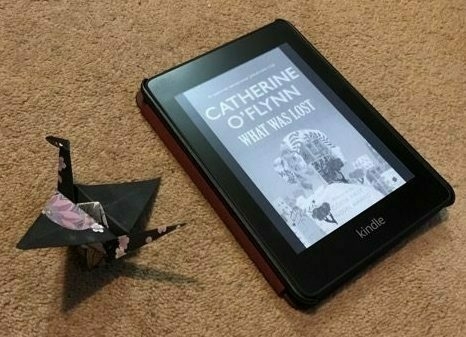Category: Longform
You are viewing all posts from this category, beginning with the most recent.
The Seventh Function of Language, by Laurent Binet, Translated by Sam Taylor (Books 2019, 14)
I need to start making notes about where I hear about books. This hasn’t been on my Kindle for long, but I have no idea what prompted me to buy it.
I’m glad I did, though. This is great. It’s set in 1980, and Roland Barthes, the philosopher and semiologist (semiotician?) gets knocked down I the street by a laundry van. He dies later in hospital.
That much is true. But Binet uses it as the jumping-off point for a mystery caper of sorts, in various picturesque cities in Europe (and a brief dip into the US). Because Barthes was believed to have been carrying a paper detailing the titular function.
Along the way we learn things about semiotics and linguistics, aided by the police officer who is investigating the case
It’s a strange one, but pretty good.
The End of Newspaper Delivery
We’ve been getting The Guardian delivered on Saturdays for several years. Not any other days, because who has time to read paper newspapers except at the weekend? But it’s great to get up and have the paper there to read over breakfast.
Sadly, a couple of weeks back we got a note with our delivery:
Sorry, we are stopping deliveries from the 1st of October.
Not too surprising, I suppose. It’s hard to imagine that enough people get deliveries to make it worth their time and effort. And it’s not like they’re going out of business: they’ll still be selling papers, just not delivering them.
So I suppose we’ll have to go out and buy the paper on Saturday mornings, like it’s the — actually, not like it’s the past at all. I’d bet that there have been newspaper deliveries as long as there have been newspapers.
Still, it’s not like they’ve stopped everywhere. I expect there are still a few places out there that still deliver. But what next? Will our milkman stop delivering?1
In this golden age of home deliveries, remember that we depend on people being willing and able.
- Yes, we get milk delivered three times a week, since you ask. ↩
Jason & Dan
If you saw my post the other day complaining about typography, you might have been confused. I went to see Jason & The Scorchers last Friday. They were playing in a co-headline tour with the Kentucky Headhunters and Dan Baird & Homemade Sin.
On the night we saw them, the order they took the stage was: Headhunters, Scorchers, Homemade Sin.
That was completely the wrong order, at least for the audience at London’s Shepherd’s Bush Empire on that night. The energy and connection of the Scorchers meant that the peak for the whole event came as they finished their set — in the middle of the evening.
No doubt you think I just think that because I’m a fan of the Scorchers, and not particularly of Dan Baird. And there is some truth to that. But I watched the last twenty minutes or so from off to one side — OK, I was standing at the bar — so I had a good view of the front of the crowd; and it was clear that they weren’t as excited, as into it, as involved, as they had been an hour before.
No matter, it was still a great night, and I’m sure some people were happy that the running order was that way round. What drove me to post that picture, though, was the distraction that backdrop caused me. I couldn’t really appreciate the music for staring at it.
In case it’s not obvious to you, take a look at the ampersand, and tell me how there’s any possible way it can make sense in that orientation.
Tarantino Thoughts
Quentin Tarantino’s Once Upon A Time In Hollywood is kind of a love story, kind of a biopic, and kind of a history.
Note that this post contains spoilers. Don’t read on if you haven’t seen it and care about being spoiled.
Or maybe “buddy pic,” rather than “love story;” but the relationship between the two leads will be analysed for its homoerotic content, no doubt.
How it certainly has been described is “a love letter to Hollywood,” and that’s fair enough. What it also is, is a counter-factual, or alternative history. But don’t worry, I’m not going to claim this one for SF.1
The main characters – fading cowboy actor Rick Dalton, played by Leonardo DiCaprio, and his regular stunt double Cliff Booth, played by Brad Pitt – are invented. But most of the other named characters, and many who are mentioned or appear as extras, are real people. The most significant of these is Sharon Tate, played by Margot Robbie. And it’s her story that makes this film most interesting, and maybe problematic.
Because of course she died tragically, murdered by members of Charles Manson’s “Family” cult. And in this version — she doesn’t.
If you know the history — which of course, many younger people won’t, which makes for different ways of experiencing the film — then you spend half the time expecting the massacre. There are captioned dates, and even though most of us wouldn’t know the date of the murders, there can’t really be any other reason for showing them. And then when it comes, something else happens.
The violence in that scene is gruesome, over the top, ludicrous — almost hallucinogenic, making me wonder if the tripping Booth2 is meant to have hallucinated some or all of it. But there’s no need for there to be so much of it, or for the majority of it to be directed at women. The “Family” did consist largely of women, I guess, but I can’t help but feeling that Tarantino is revelling in it a little too much.
And on top of all that, as my family agreed after seeing it: there’s no real need for the whole Sharon Tate thread of the story. It would have made a fine tale if were just about the two actors against the backdrop of late-60s Hollywood. I wonder what the point of it was. Did Tarantino feel he could in some way “save” Sharon Tate?
The Haunting of Hill House by Shirley Jackson (Books 2019, 13)

A genuinely chilling, even scary, ghost story, is not something you read that often. Or I don’t, these days, at least.
Combine that with compelling characters, comedy, and tragedy, and you’ve got kind of a small masterpiece.
I only say “small” because it’s quite short. I only know Jackson from a film version of “The Lottery” that they used to show us in school. I’m not sure why they showed us it, exactly, because we didn’t study it in English, and as far as I recall we didn’t discuss it. I think maybe it was a sort of treat, and the school only had a few films, that it showed repeatedly. These were actual films, I should add. Played on a projector, watched on a screen.
Anyway Jackson’s story always stuck with me, and now this one joins it.
The 392 by Ashley Hickson-Lovence (Books 2019, 12)

We went to WOMAD a couple of weekends ago, and in the literary tent we caught the end of a reading from, and an interview with, this young Hackney writer. It was an interesting talk and the book sounded compelling, so we bought a copy (and got it signed).
It’s set over 36 minutes on the inaugural journey of a new (nonexistent) London bus route, from Hoxton to Highbury. Told as the thoughts and conversations of various passengers (and the driver).
If you’re familiar with the area and the local slang (which may in fact be national or global slang in places), it’s particularly enjoyable. But the themes are universal, so don’t suppose it’s only for Hackney & Islington folk.
I have my problems with the ending, but it’s well worth checking out (and it’s very short, and in bite-sized pieces, if you’re looking for something easy).
What Was Lost by Catherine O’Flynn (Books 2019, 11)

This was recommended to me by an Open University tutor when I was doing the creative writing course a few years back. Which experience, I note, I barely wrote about here. I have a Diploma in Creative Writing, don’t you know?
Anyway, there was an exercise which included writing a plan for the next major piece we were going to write. I wanted to write something that was set in an exotic city, and I mentioned in my plan that I wanted the city to be a character in the story. I was thinking maybe of something like China Miéville’s Bas-Lag.
My tutor suggested that the shopping centre in this book might be a similar kind of thing. Which turns out not really to be accurate. It’s set largely in and around the mall, and some people say they have a sense of it watching them, but nothing is ever made of that.
It’s strange, in that it starts off apparently being a kids’ book, or at least YA; but after the first part it takes a turn, into something else entirely.
It’s not bad, but I wouldn’t particularly recommend it.
Milkman by Anna Burns (Books 2019, 10)

This is not mainly a book about The Troubles; nor about religion or politics, though it is about all of those. It's a book, above all, about gossip and rumour and silence, and the harm that those can do to a person, to a society.
The unique approach — no-one is named, almost no proper names appear — I found quite endearing. And far from obfuscating things, it many ways it makes the story easier to follow. Instead of having to remember whether Mary, Margaret or Roisin is the oldest sister, it's “first sister.” “Oldest friend;” “maybe-boyfriend.” Honestly, all books should be like this. Relationships are important, after all.
Though you can also see it as a sly reference to the common complaint about living in small communities, that you're always someone's daughter, someone's brother — never yourself.
Anyway, Booker Prize winner, and all. Dead good.

